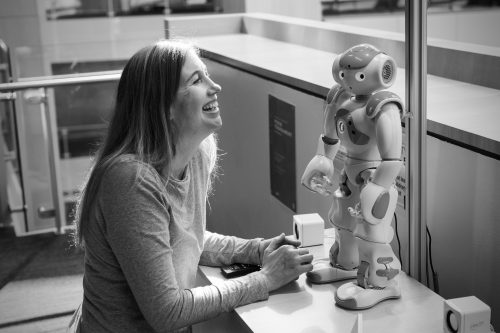As an undergraduate computer science major at Yale, Jaime Teevan (YC ’99) sold her senior thesis to the company she had interned at the summer before. Since then, she has continued studying how computers can help people manage information and accomplish their goals, most recently as Microsoft’s chief scientist for experiences and devices.
Teevan came to Yale intending to major in physics but switched to computer science as a sophomore after her first programming course. “I had more fun staying up all night programming than I had staying up writing papers,” Teevan recalled.
During her junior summer, Teevan interned at Infoseek, an early internet search engine. Back at Yale, she developed her senior thesis using ideas she had learned that summer. In those days, the most common way to find information on the internet was Yahoo, which responded to user queries with manually created directory pages. However, Teevan’s project used link analysis to create those pages algorithmically. “Basically, if a bunch of web pages pointed to a particular page and all used that term, then that page would likely belong on the directory page for that term,” Teevan explained. She sold her senior thesis to Infoseek and returned to the company briefly after graduation as a software engineer.
Teevan then attended graduate school at MIT, where she studied personalized search. “Initially, people thought of search as looking for new information,” she said. “But the truth is that we often use search to stay within our known space.” Her doctoral thesis found that over a third of the queries people issue are repeats, and over a third of links they click are ones they’ve clicked on before.
“That changes the kinds of tools you build for people,” Teevan explained. After MIT, she joined Microsoft Research as a research scientist, continuing to studying how technology can help people work more effectively. There, Teevan developed Bing’s first personalized search algorithm, which optimized results based on repeat queries.
That experience prompted her to think about the search experience as a whole. In general, humans tend to automatically think slower results are lower quality. “So not surprisingly, search engines spend a lot of time trying to be very fast,” Teevan said, “But it’s sort of ironic that we do that, because over half the queries you issue to a search engine are part of longer sessions.” For example, a user might plan a Hawaii vacation over several days. Considering the entire session would allow engineers to build a better overall experience.
Teevan then began studying slow search, how search would change if it was not optimized for speed, both in terms of user experience and software algorithms, leading her to her second main research interest: microproductivity. Whereas slow search looks at the individual queries and how they combine to make a larger task, microproductivity breaks down a larger task into its components.
“If I’m sitting in a meeting and waiting for it to get started, I might have a few minutes,” Teevan said. “This would be an ideal time to complete a small task.” By finishing many small tasks, one could accomplish something larger. Thus, Teevan studied how computers can break down tasks so that each component can be completed independently.
In 2017, after eleven years at Microsoft Research, Teevan became technical advisor to Satya Nadella, Microsoft’s CEO. “It was a transition to thinking about Microsoft the company,” Teevan said. “We help organizations be more productive. I had looked at that from a research perspective, but I hadn’t really understood it from a company perspective.”
A year later, Teevan entered into her current role as Microsoft’s chief scientist for experiences and devices, which includes Windows, Office, Cortana, Teams, and Surface. Nowadays, she spends her time thinking about the future of work.
Teevan says the biggest technological change over her career was the move to cloud services, which allows us to see people’s behaviors on a larger scale. The insights that prompted her to investigate slow search and microproductivity both came from studying behavior logs in the cloud. “[The cloud has] fundamentally changed our ability to support people getting the things they care about done,” Teevan concluded.

